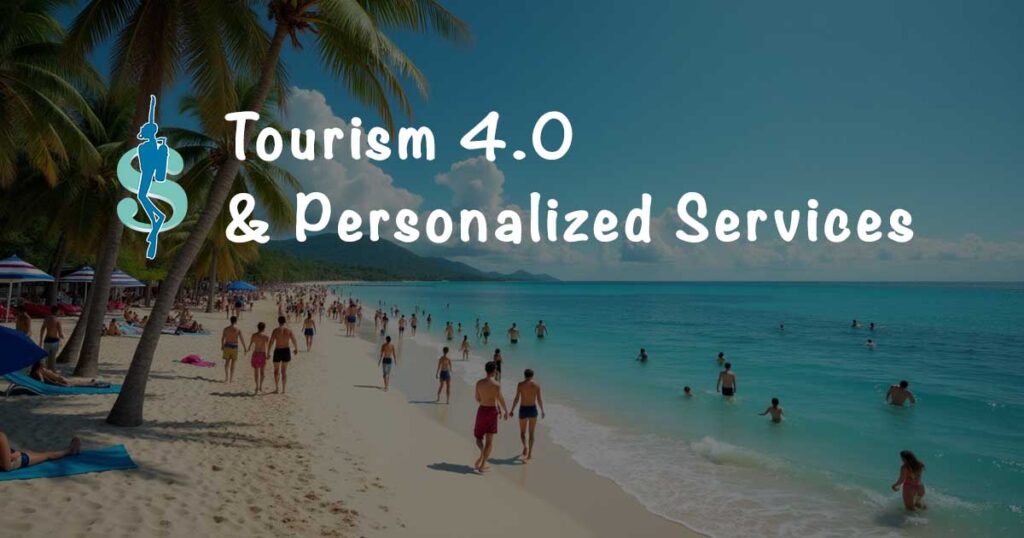Tourism 4.0 & The Future of Personalized Services
Key Themes Surrounding the Application of Industry 4.0 Technologies Within the Services & Tourism Sectors
This post summarizes information from McKinsey & Company, the BDC, and the European Tourbit project under Tourism 4.0 to outline central concepts and significant thoughts around how Industry 4.0 tech can be used in service industries, especially tourism.
We will highlight the transformative potential, challenges, and necessary strategies for businesses – especially small businesses – to adapt and thrive in this fast-evolving landscape.
This post is part of our Blueprints 4.0 for a Healthier Dive Industry Business Model series by the Business of Diving Institute and Darcy Kieran, author of:
Contents on This Page
Core Concept: Industry 4.0 and its Application to Services and Tourism
Industry 4.0 refers to the fourth industrial revolution, which integrates digital technologies like AI, IoT, and big data into manufacturing and industrial processes to create smart, connected systems and enhance efficiency.
Previous industrial revolutions were driven by mechanization, electrification, and automation. The fourth one is based on digitization. It is driven by “disruptive” trends involving the rise of data and connectivity, data analytics, human-machine interaction, and advances in robotics.
It was born in manufacturing. But now, the principles and technologies of Industry 4.0 are increasingly relevant to service-oriented industries.
In services, the four eras of evolution could be manual (1.0), internet-enabled (2.0), self-services (3.0), and now what? Possibly highly personalized, seamless, end-to-end, frictionless, empathic services that anticipate customer needs using new technologies, including artificial intelligence (AI).
Tourism 4.0: A Specific Application
Tourism 4.0 could aim to enable collaboration between stakeholders of the “smart tourism ecosystem” to create enhanced experiences using new technologies from Industry 4.0. Basically, it’s about unlocking potential through technological innovation.
A key aspect of Tourism 4.0 is a shift in focus. The tourist is no longer at the center. Instead, in Tourism 4.0, we put local inhabitants and their quality of life in the center with other stakeholders around them. It involves developing systems that share data and profit with local communities through digital, disruptive tools.
In other words, instead of outsiders arriving with their big boots in an island nation, opening a dive resort, and sending all the money home (with a big chunk going to a dive training agency in California), we are now looking for socially and culturally responsible operators, sharing the wealth with the community and ensure a sustainable usage of the ocean and the reef.
Among the technologies used in the Tourism 4.0 industry, we have:
- Artificial Intelligence (AI)
- Augmented Reality (AR)
- Virtual Reality (VR)
- Internet of Things (IoT)
- Blockchain
Although blockchain is mainly used in reference to cryptocurrency, it is fundamentally a system that records transactions across computers and, therefore, across stakeholders.
About AR… Well… Imagine a scuba mask that gives you information about the fish or coral you are looking at!
Benefits of Embracing the Digital Transformation
There are several potential benefits of adopting Industry 4.0 technologies in services and tourism:
- Enhanced Customer Experience: Tourism 4.0 aims to create enriched experiences with services that can anticipate customer needs.
- Increased Efficiency and Productivity: Information & Communication Technology (ICT) can boost productivity, accelerate sales, and open new markets.
- Data-Driven Decision Making: Without data, businesses make decisions based on a gut feeling – we are used to that in the scuba diving world! That’s why The Business of Diving Institute is trying to help with Your Dive Industry Compass.
- Personalized Services and Targeted Marketing: Analyzing data on tourist preferences allows for targeted marketing and personalized experiences.
- Customer Relationship Management (CRM) systems can help businesses understand their customers better and more readily capitalize on sales opportunities.
- Sustainable Practices: IoT (Internet of Things) is not just for your fridge! IoT sensors and smart infrastructure can contribute to a more responsible and eco-friendly travel industry by optimizing resource consumption and tracking environmental impact.
- New Business Models: Industry 4.0 can enable new service offerings and business models, such as the product-as-a-service (PaaS) model. In this case, instead of selling products outright, we offer access to their benefits through a subscription or pay-per-use model, focusing on the customer’s needs and outcomes rather than ownership. Since we know that casual scuba divers are less likely to buy a complete set of gear, this new business model could become valuable.
Challenges to Tourism 4.0 Adoption
Despite the potential benefits, Tourism 4.0 comes with challenges:
- Financial Barriers: There are upfront costs to acquire and implement Tourism 4.0 technologies, which is always a concern for small and midsize businesses (SMEs).
- Difficulty in Quantifying ROI: With a low volume of transactions in many dive businesses, it may be difficult to quantify and demonstrate the Return on Investment (ROI), making it hard to justify the initial investment.
- Skills Gap: Technology is useless if we don’t use it properly! Tourism 4.0 requires training and upskilling programs to enable dive businesses and industry professionals to effectively leverage new technologies.
- Data Privacy and Security Concerns: With increased data collection, ensuring “user privacy and security” is a significant, valid concern.
- Keeping Pace with Technological Evolution: The rapid evolution of all the involved technologies makes it difficult for SMEs to choose the right solutions and keep up with the pace of changes.
Strategies for Successful Adoption of Tourism 4.0
Recommendations for businesses and policymakers to facilitate the successful adoption of Industry 4.0 in services and tourism:
- Develop Clear Strategies and Goals: Before implementing any digital initiatives, we need clear, measurable goals aligned with the overall business strategy.
- Do Not Neglect Customer Needs and Engagement: Even though local inhabitants are the center of Tourism 4.0, our strategies should still aim to build strong customer connections and raise brand awareness by being strategic and intentional. Authenticity remains key to creating genuine connections even when using new technologies.
- Invest in Employee Training and Reskilling: To keep our employees up to date, we should foster a culture of continuous learning.
- Secure Necessary Funding and Financial Incentives: Governments and industry associations can develop grants, loans, and financial incentives specifically for SMEs to adopt technology. With DEMA being a tiny trade association, we may want to keep an eye on OIA (Outdoor Industry Association), ATTA (Adventure Travel Trade Association), and other significant trade associations that could help us along the way.
- Address Data Privacy and Security Proactively: In Tourism 4.0, businesses need robust data privacy policies and secured technology infrastructure. Public administration and trade associations can support this by facilitating access to cybersecurity experts, creating best practice guides, and developing self-assessment tools. Building consumer trust through transparency is also crucial.
- Foster Collaboration and Knowledge Sharing: Sharing best practices would help everybody.
- Develop Clear ROI Models and Transparent Maintenance Plans: To address concerns about investment justification, industry leaders and technology providers should develop clear ROI calculation tools and offer fixed-cost maintenance plans.
- Embrace a Phased Approach and Continuous Improvement: Learning and progress takes time. Embedding a culture of digitalization into the business strategy is crucial for supporting competitiveness. Tracking and measuring performance is essential for continuous improvement.
Conclusion on Tourism 4.0
The convergence of Industry 4.0 principles and technologies with the services and tourism sectors presents a transformative opportunity for:
- enhanced, personalized customer experiences,
- increased efficiency, and
- optimized sustainable practices.
However, realizing this potential requires a concerted effort to address:
- financial barriers,
- skill gaps, and
- data security concerns.
By developing and implementing smart strategic plans, fostering collaboration, investing in people and technology, collaborating with local communities, and prioritizing customer trust, businesses can navigate the digital revolution and thrive in the era of Services 4.0 and Tourism 4.0.
You may also be interested in the following podcast episode about Tourism 4.0.
If you found the information on this page valuable, would you consider buying me a coffee?
Either way, let’s work together on “raising the bar” in the dive industry to satisfy today’s consumers!
Your Dive Industry Compass
Scuba Diving Market Research, Surveys, Reports & Statistics
Blueprints 4.0: A Healthier Business Model
Scuba Diving Industry Structure, Competitive Analysis, Business Models & Strategies for Growth With The New Scuba Diver
Living The Scuba Dream
Plan Your Scuba Instructor Career & Deep Dive the Plan
You may also be interested in The Immersion Zone (our podcast), Scubanomics (our newsletter for dive professionals), and our published books & reference guides.





